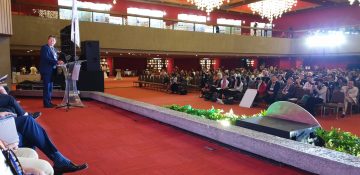Evaluation International Leprosy Congress in Manila
A brief summary of the experiences and findings of the conference from NLR staff.

The 20th International Leprosy Congress took place in Manila from September 10th-September 13th. A delegation of NLR staff was present and actively participated and contributed to the conference. Below is a summary of the experiences and findings of the conference. Overall it was perceived as very useful and a great success.
The programme
The entire conference had presentations on leprosy through various dimensions that were refreshing. NLR colleagues were fascinated by the fact that social science could be an effective perspective to evaluate our work on health intervention and we could learn a lot about the best practices from other countries. The congress’ side events were viewed to be just as important as the official sessions.
NLR presentations
Several NLR staff members gave presentations during the plenary sessions. NLR director and ILEP president Jan van Berkel told a moving story of Ajay who is not allowed to play football with the other kids when they find out he has leprosy. Medical Director Wim van Brakel talked about leprosy in the global context of NTDs and cross cutting interventions. Nienke Veldhuijzen presented the LRI’s perspective on leprosy research. An impressive total of 34 presentations at the ILC are from LRI funded projects.
Also during the parallel sessions NLR employees gave well-received presentations. For instance, Dr. Suchitra from NLR India talked about knowledge, attitudes and perceptions of leprosy in India. Deputy Director Nandlal Banstola from NLR Nepal gave a hopeful lecture that with the implementation of SDR-PEP Nepal is a step closer to beating leprosy.
As NLR, we were able to demonstrate many innovations. There was great emphasis and enthusiasm around PEP intervention and implementation work. Our project to ‘Stop the transmission of leprosy’ (PEP++) was very well represented as we had 7 presentations directly linked to the programme.
New and exciting ideas
There is broad consensus that we need to do (even) more to promote participation of persons affected in research and in other aspects of our work. It is also very relevant to PEP++ in terms of advocacy done by persons affected, but also showed how much this group has been empowered over the years.
Another clear finding was that partnerships are crucial; anti-leprosy organisations should go for joint funding applications as a matter of principle.
In short, a successful congress and NLR will be present at the 21st ILC in India in three years.